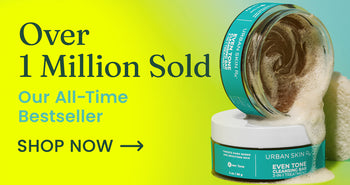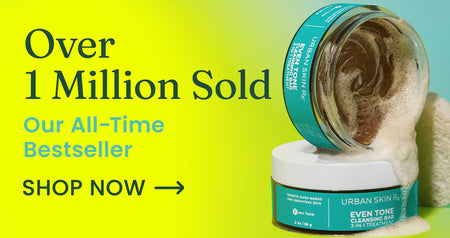Using Lactic Acid for Skin: 6 Key Benefits

With Lactic Acid becoming an increasingly common skincare ingredient, you are likely looking to learn more about why this AHA is in the spotlight.
Today, we’re diving into everything you should know about Lactic Acid, including six key benefits and how you can start incorporating this star ingredient into your routine.
What Is Lactic Acid?
Lactic Acid is an over-the-counter chemical exfoliant made from fermented lactose. It is currently a common element in various skincare products, and it belongs to a group of acids known as Alpha Hydroxy Acids alongside Glycolic and Mandelic Acids.
This key ingredient not only helps improve the appearance of the skin but also aids with skin moisturization. It’s a win-win ingredient!
Why Use Lactic Acid?
Lactic Acid offers a slew of well-known benefits. Some of these include exfoliation that supports healthy cell turnover and the removal of dead skin cells from the epidermis or top layer of the skin.
A Lactic Acid treatment with a concentration of 12% may bring you noticeable results like firmer, more supple-looking skin, thereby reducing the look of visible fine lines and wrinkles. When used as part of your regular skincare routine, Lactic Acid can help reduce the appearance of aging skin by working to support and maintain skin elasticity and firmness.
Lactic Acid products can help anti-aging efforts by helping diminish the appearance of sunspots, age spots and fine lines and wrinkles by smoothing and softening them.
Lactic Acid may penetrate the skin's deeper layers in such high quantities. Lower doses of roughly 5% have no effect on the skin's middle layer. However, on a more surface level, they have comparable impacts to 12% Lactic Acid formulations.
It aids in the improvement of the skin's natural moisture factor or the way the skin maintains its hydration. Lactic Acid, in a nutshell, helps to keep the skin hydrated and less dry.
Lactic Acid can also help with acne-prone skin by working to reduce the appearance of blemishes, calm irritation and soothe hyperpigmentation.
Is Lactic Acid Right for Your Skin?
It’s important to think about what your current skin concerns are and if Lactic Acid will be safe for you to use.
Lactic Acid is commonly included in over-the-counter lotions and creams for keratosis pilaris, which can look like tiny pimples on the backs of the arms. This acid can help smooth down these bumps by dissolving the skin cells that form around the hair follicle, clogging it.
Lactic Acid is also commonly found in topical therapies for eczema-prone skin.
Using a Lactic Acid chemical peel has the potential to create side effects such as redness, swelling, a burning sensation, severe itching, or peeling skin. Keep these in mind before using Lactic Acid for the first time.
Skin Concerns
Talk to your doctor right away if you detect any signs of an adverse skin reaction. Also, refrain from using any exfoliants in addition to Lactic Acid, as Lactic Acid is already a chemical exfoliant. Over-exfoliating your skin can lead to uncomfortable dryness or irritation.
If you have skin conditions like psoriasis or rosacea, you may also want to avoid using a Lactic Acid peel. Consult your dermatologist for advice regarding whether Lactic Acid may be safe for you to use.
See your doctor or dermatologist if you have melanin-rich skin. Chemical peels may raise your risk of hyperpigmentation.
It can be best to do a patch test of a new product or ingredient on a small area of your skin to see if it’s right for you. If you develop any issues, it’s important to stop the use of the product and let your skin rest. Protecting your skin should be your first priority!
Our goal is to help you find the right products for your skin concerns. If you have any questions or issues at all, feel free to reach out to us. We are here to help!
How Do You Use Lactic Acid Safely?
Despite being a gentler AHA exfoliator than BHAs (like Salicylic Acid), you might not want to use Lactic Acid on a regular basis. You run the danger of damaging your skin's natural barrier by over-exfoliating. Unless your doctor advises otherwise, it may be best to use this powerful skin resurfacing substance every other night.We don’t recommend using Lactic Acid in combination with Retinoids or harsh scrubs because this could lead to irritation.
You can trigger post-inflammatory hyperpigmentation in severe cases, which occurs when the skin generates additional melanin as a normal response to stress. It might take a long time for this form of hyperpigmentation to fade away.
Lactic Acid, similar to Retinol, can increase sun sensitivity causing you to burn more easily. Avoid sun damage by using a high SPF sunscreen while using Lactic Acid.
How Can I Incorporate Lactic Acid in My Skincare Routine?
At Urban Skin Rx®, we have a handful of products that contain Lactic Acid. Some of our favorite products are as follows:
-
LacticGlow Micropolish Resurface & Brighten Cleanser - If you're worried about fine lines, wrinkles, dark spots and the occasional pimple, LacticGlow Micropolish Resurface & Brighten Cleanser is the gel cleanser for you! This exfoliating cleanser is the perfect first step in any skincare routine. It lathers up into a rich, foamy froth that helps polish, resurface and brighten skin.
LacticGlow Micropolish Resurface Brighten Cleanser is also a part of our Pro Strength Collection™.
-
HydraFirm + Brightening Serum - Hyaluronic Acid, Alpha Arbutin, Niacinamide and other ingredients work together in HydraFirm + Brightening Serum to deliver many advantages in one container. Follow your cleansing step with this serum for radiant-looking skin.
- Clear & Even Tone Clarifying Glycolic Pads - With 7.5% Glycolic Acid, Clear & Even Tone Clarifying Glycolic Pads eliminate excess oil and reduce the appearance of blemishes and post-acne dark spots. These pads are perfect for a quick cleanse after a workout at the gym
Urban Skin Rx® makes it easy to take steps towards clearer, brighter and more even-toned skin. Our skincare is accessible for people of all skin tones and types so that you can feel confident and comfortable in your skin, no matter what.
How Can You Find the Right Products?
Even after learning about specific ingredients, it can be difficult to decide on the best products for your skin. At Urban Skin Rx®, we have a free skin quiz that can help point you in the right direction with personalized advice from our team of Licensed Aestheticians.
We can even accommodate your requirements by assisting you in selecting products that are within your budget. We know it can be tough to find effective skincare that doesn’t break the bank — that’s why we are committed to helping you along your journey to clear, even skin.
Are you having trouble finding items that are suitable for your skin type?
Our Even-Tone Experts™ can help answer all of your inquiries, address your skin concerns and recommend products and routines for you — all from the comfort of your own home!
We will select skincare for you based on if you have oily, sensitive or dry skin and help you target your main skin concerns. Using the right products for your skin type and issues can help you achieve the greatest and quickest results, and our Even Tone Experts are here to help you do just that.
Plus, if you try our skincare quiz, you could receive 20% off your order! Take our skin quiz today for a brighter complexion tomorrow.
In Conclusion
Lactic Acid is a chemical exfoliant that is generated from fermented lactose, a carbohydrate found in milk. It's now a standard ingredient in a wide range of skincare products. Lactic Acid aids in the removal of old, dull skin cells from the skin's surface. It moisturizes your skin while also fading sunspots and softening the look of fine wrinkles.
Lactic Acid can also be a great option for sensitive skin as it is a gentle exfoliant that works to buff and smooth skin without causing irritation.
Here at Urban Skin Rx®, we work to help you achieve and maintain even-toned skin. Schedule a virtual consultation with one of our Licensed Aestheticians, or get started with our free skin quiz to learn more about the ideal products for your skin!
Engagement Manager



